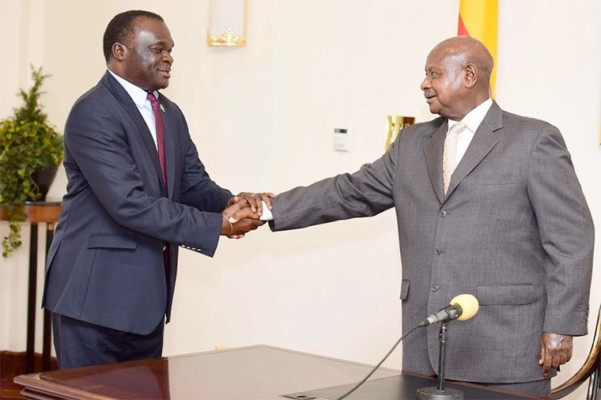Court stops law society’s meeting meant to discuss Museveni letter to CJ

Chief Justice Alfonse Owiny-Dollo and Resident Museveni shake hands during a recent meeting. PHOTO\ FILE
What you need to know:
- The meeting was to, among others, discuss the interference of judicial independence by President Museveni and his Executive.
The High Court in Kampala has issued a temporary injunction, stopping the extra ordinary general meeting that had been called by the Uganda Law Society (ULS) and slated for this afternoon.
The meeting was to, among others, discuss the interference of judicial independence by President Museveni and his Executive.
“A temporary injunction issued against the respondent (Uganda Law Society), restraining it from calling, convening and arranging an extraordinary general meeting on requisition of members' petition until the final determination of the main application,” Justice Musa Ssekaana, the head of the Civil Division of the High Court, ordered.
“In the result for the reasons stated herein above this application succeeds and is allowed and the costs shall be in the cause,” he added.
While issuing the interim injunction, Justice Ssekaana reasoned that the balance of convenience was to maintain the current status quo in the dispute, which is not to hold the extraordinary general meeting this afternoon.
“It has been shown by the applicant that the balance of convenience lies in maintaining the status quo and the balance of convenience cannot be ignored in such an application which alludes to breach of law or passing of illegal resolutions which will cause irreparable damage or injury,” held Justice Ssekaana.
He added: “Such damage or injury cannot be atoned for or compensated in damages.”
The issuance of the injunctive orders followed a successful application filed by Mr Brian Kirima, one of the members of the Uganda Law Society.
Core to his application was that the matters that were to be discussed this afternoon in the extraordinary general meeting were “unlawful” and “outside the law and its mandate”.
Last month, a section of concerned lawyers, petitioned their society president, Mr Bernard Oundo to call for an extraordinary meeting to, among others, discuss what they call the attack on the independence of the Judiciary.
The lawyers partly wanted to discuss President Museveni’s letter to Chief Justice Alfonse Owiny-Dollo on the attachment of the Muslim property including the national mosque in Old Kampala.
“We, the undersigned members of the Uganda Law Society, concerned with a letter dated December 2023, from His Excellency the President, addressed to the Chief Justice giving directions on the conduct of a court matter, do hereby, petition for an extraordinary general meeting of the Uganda Law Society under Section 16 ... to be held within 14 days from the deposit of this petition with the secretary of the Uganda Law Society.” reads in part the petition of the concerned lawyers dated January 8 led by Mr Isaac Kimaze.
Core to President Museveni’s letter to the Chief Justice was the former directing the latter to have a review of an order on the then pending attachment and sale of eight Muslim prime properties including the land where the national mosque sits in Old Kampala.
The head of state was irritated about the court’s order to have a national mosque among the prime properties that were to be attached and auctioned.
“…However, I was most surprised to read in Mufti Mubajje’s letter that among the Moslem properties to be affected is the national mosque at Old Kampala!!. What sane person, let alone a judge, can make such orders? How can a mosque or church be attached for debts carelessly entered into by officials of that faith?” an angry Museveni wrote to the Chief Justice.
Adding: “I, therefore, request you to review this matter yourself and see how to restore sanity. His Eminence Mubajje alleges other examples of misconduct and collusion. You should study all those, what, however, provoked me was the audacity of attaching the national mosque. The NRM freedom fighters and the government they head, cannot be associated with sick logic.”
The then looming attachment of the Muslim properties followed a court order, arising from a protracted sale of land in which the Uganda Muslim Supreme Council (UMSC) sold land located in Sembabule District to businessman Justus Kyabahwa at Shs3.5b.
The debt later jumped to about Shs19b.
Following President Museveni’s letter to the Chief Justice, the Court of Appeal issued an order temporarily, stopping the said attachment and sale of the Muslim property.
The actions of the head of state sparked outrage especially, from the legal circles, decrying the attack on the independence of the Judiciary by the executive arm.
The concerned legal experts contended that there's a need for respect for the separation of powers in government as the same is crucial for maintaining a system of checks and balances, preventing the abuse of authority, and safeguarding human rights.
Article 128 (2) of the 1995 Constitution states: "No person or authority shall interfere with the courts or judicial officers in the exercise of their judicial functions."
It's upon this background that the concerned lawyers had wanted their president, Mr Oundo to call for an extraordinary meeting to discuss these attacks on the independence of the Judiciary by President Museveni. They claimed their president, Mr Oundo had not done enough to stand with the Judiciary and defend its independence.
“We are alarmed by the failure of the governing Council of the Uganda Law Society to issue a public statement on the matters in this petition as a customary; and the failure by the president of the Uganda Law Society to heed calls to issue a public statement on these matter as a statutory imperative…”the concerned lawyers wrote.
Adding: “… the knowledge of the public’s reliance and expectation on the Uganda Law Society on matters of such public importance, our role as advocates in speaking truth to power, in holding government accountable, and as first-line defenders in the unending public duel against executive overreach.”




